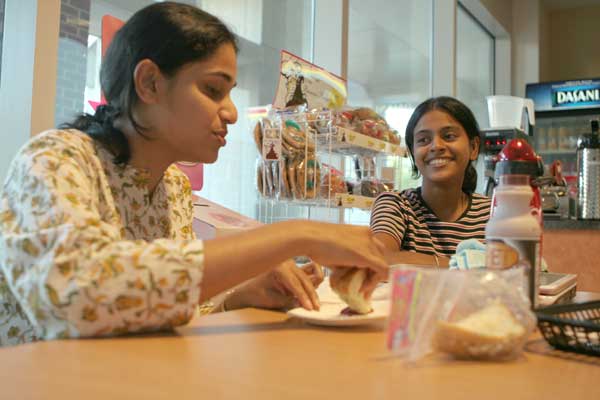Standing ten minutes waiting in line for C-Store food every day is not what engineering students want.
“All it has are wrap sandwiches and chips — it doesn’t even really have food,” Jackson Thorton, a senior in material science engineering, said. “I never really eat there because it doesn’t really look too appetizing.”
Currently the students who spend their days on Centennial Campus have no restaurants, no student center, no gym, no career center and no library. And they are there sometimes as long as 12 hours a day.
“Most students spend six hours a day there between classes and studying,” Kristina Marshall, a senior in material science engineering, said. “I work there also, so for me it’s about 12 hours.”
Thorton and Marshall worked with two other students in their material science senior design class, Paul Fox and Jeremy Woock, to create a survey and analysis of what students and faculty want on Centennial.
They began by brainstorming the questions they wanted to ask students and faculty, receiving help from many areas.
“We got ideas from other groups as well…it’s been something we’ve talked about in general in the lounge. Everybody is always complaining about these issues,” Fox said. “It was fairly easy to work on because it affects us so much.”
They interviewed 40 students and 10 faculty members about food options, student leisure and student issues.
The students and faculty rated the questions from one to five, one being not important and five being very important. The senior design team considered issues which received a rating above four as the most vital.
The issues most important to students and faculty is the lack of an engineering library and the remote food options, according to their results.
Marshall said that she often researches for her classes and labs in manuals and books that are only available at D.H. Hill Library and cannot be checked out.
“Several times I have needed to look things up on the [library] Web site and then go to main campus to look at the book,” she said. “And then go back again because you can’t check it out.”
While the library and study problems are frustrating, what is prominent in most student and faculties minds is the lack of food options — or the lack of food in general.
“I think the food problem is the most important thing for the people we talked to; it’s one of their top priorities and one that can be fixed sooner rather than later,” Marshall said.
Centennial Campus has one C-Store and one coffee shop, so most students bring their lunch or go hungry.
“I usually bring my lunch, or if I have time I run home and eat something at home,” Woock said. “Or I just don’t eat.”
Other students will buy snacks from the C-Store or make a journey to Mission Valley.
“I usually get something small, and depending on time if I’m on campus I will usually go to the C-Store, which isn’t very good and kind of overpriced,” Fox said. “Or I will walk over to Mission Valley, like Quizno’s — but I don’t really have a lot of time to do that.”
Centennial has a plan to include restaurants, a jogging trail and an 18-hole golf course — but the plan is to be implemented over a period of 100 years. And current students are feeling hunger pains now.
The material science senior design group brainstormed ideas to help fix the problem, including renting out space temporarily to fast food restaurants or selling land to a franchise that could have a building up in only a few months.
“We were thinking if they could just rent out some space to commercial enterprises then they could get food over there quick,” Thorton said.








